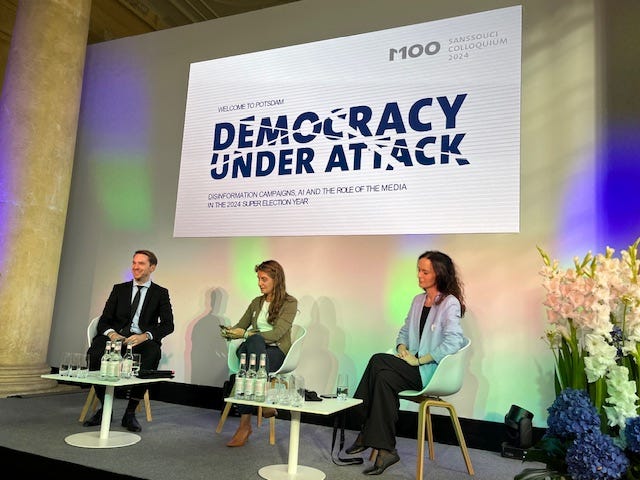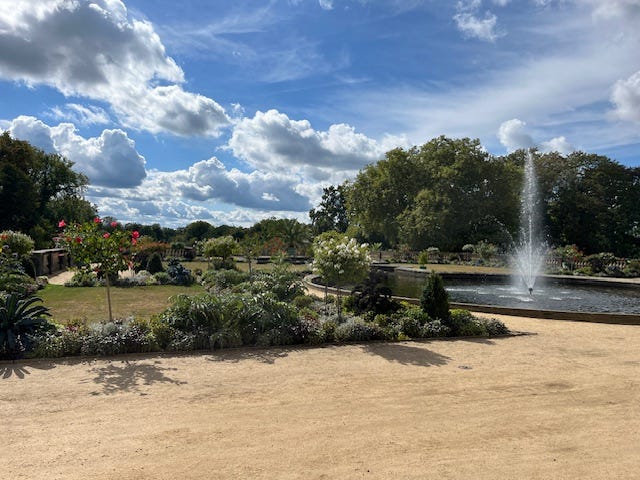After five years of pendeln (that’s German for commuting), I’ve just arrived in Berlin full-time. I’m taking up a year-long fellowship at the Institute for Advanced Study, which brings together academics and thinkers from around the world. That starts on Monday. Yesterday (Sept 12), on my first full day back, I was in Potsdam for an annual conference of media figures. M100 has been going for exactly 20 years, including during the pandemic; indeed, in 2020, suitably socially distanced, I was on a panel with a certain Olaf Scholz, who was Angela Merkel’s Finance Minister at the time.
This conference is set in the splendour of the palace so beloved of Frederick the Great. This most intriguing monarch, man of enlightenment and man of war, spent as much time as he could here and instructed that he be buried in its grounds next to his 11 dogs. (I devote chapter to Frederick in my book, ‘In Search of Berlin’). The passionate Francophile that he was, he called it Sanssouci, without a care.
The title of this year’s Sanssouci Colloquium, Democracy Under Attack, suggested that we did have one or two cares. The participants, from Bulgaria to Sweden to the US to Lithuania, plus many Germans, were looking at democratic resilience and countering disinformation. These are familiar topics on the conference circuit and they can be wearisome if they end up focusing on analysing the (familiar) problems rather than coming up with possible solutions.
The group also included six Ukrainians, who at gatherings such as this tend to be afforded special status. They come to hammer home the message about the need for Western support, of the military rather than rhetorical variety. They are always thanked for ‘making the long journey’. They are applauded and lauded, but their frustration is often palpable.
Olga Rudenko, editor-in-chief of the Kyiv Independent, reminded the audience of a keynote speech she gave in 2022, six months after Vladimir Putin’s invasion of her country. The mayor of Kyiv, Vladimir Klitschko, also attended, to accept the award given to ‘the people of Ukraine’. Luminaries such as they could spend their entire time travelling the (Western) world picking up prizes for bravery. But as a somewhat jaundiced Rudenko repeated what she had said two years ago in the same hall:
‘Awards are nice but tanks are better’.
The tanks arrived long ago, if late. The anti-aircraft weaponry arrived long ago, if late. The longer-range missiles have recently arrived, if very late, and with very limited permissions on where to use them. As Washington, Berlin, London and Paris hesitated, Russia has pushed forward and consolidated its military advantage. The Ukrainian incursion into the Kursk region has boosted morale, but seems so far to be a sideshow.
The Potsdam discussions focused on the West’s two glaring weaknesses: the lack of self-confidence among democratic leaders as they watch populists sweep up voters, and the fear of Putin when he warns of consequences if Russia is hit: a failure to confront the adversary without and to confront the adversary within. The more Putin manages to scare the West, the more successful he will be.
During the recent US presidential debate, Donald Trump conspicuously refused to say that he wanted Ukraine to win. His default position is to brag that he’d bring the war to an end within a day. And we know on whose terms. Kamala Harris wasn’t asked the same question, which is a shame. Her language on the conflict may suggest resolve, but her precise intentions are unclear.
There was no shortage of the customary German bashing and German self-flagellation at this forum. At the moment it is with good reason. Scholz’s three-party coalition is being pummelled at the ballot box, and pummelled in parliament over the hot topic of immigration. Yet it is on Ukraine that the international concerns are greatest. Scholz is also talking the language of ‘peace’. He comes from it from a position of political weakness, unlike Trump’s affection for Putin, which I suppose is marginally less bad.
The man who delivered the Zeitenwende, the era-defining speech in February 2022 that presaged a new commitment by German to embrace military force to defend democracy, Scholz retreated into his shell. The AfD and BSW, the far-left-meets-far-right grouping led by the woman-of-the-moment, Sahra Wagenknecht, are both avowedly pro-Kremlin. Both parties humiliated the governing Social Democrats, Greens and Free Democrats in the regional elections in Saxony and Thuringia and are set to do well again in Brandenburg on September 22.
The parties receive copious coverage in the German media and yet there is little reporting about their Russia links. The recent US Justice Department’s report on Russian disinformation was aimed mostly at American proxies but it also made several references to European countries. Coverage of the specifics has been scant.
As I made the point at the Potsdam forum (and I’ve annoyed many Germans by banging on about it in the past), where were the investigations highlighting the disreputable links between the former chancellor, Gerhard Schröder, and Putin? When I asked a senior German TV news executive about it once, shortly before the Ukraine invasion, he entreated me ‘not to be hysterical’.
Let me end on a more uplifting note, to suit the uplifting setting. The joint winners of this year’s M100 award were the prime minister of Poland, Donald Tusk, and the president of Kosovo, Vjosa Osmani-Sadriu. Tusk couldn’t be there, which left pride of place to the leader one of Europe’s smallest, most beleaguered and bravest countries.
Osmani-Sadriu reminded the audience that Germany played an admirable role in supporting Kosovo’s bid for independence and in getting Slobodan Milosevic to court. She concluded her remarks with this description of her country: ‘we are the survivors who thrive’.
There will be more in coming weeks from Germany, this most complicated and intriguing of countries. A lot of will be big-picture politics and geo-strategy but I want to go off-piste as well, delving into culture and curiosities. Bis bald.






Viel Spass